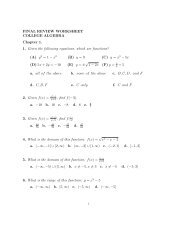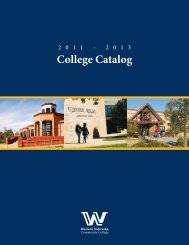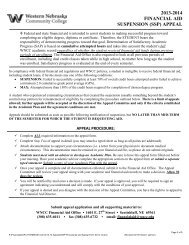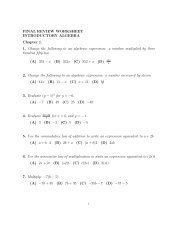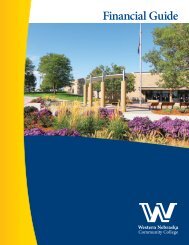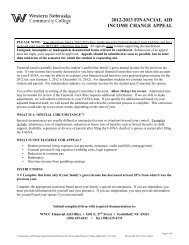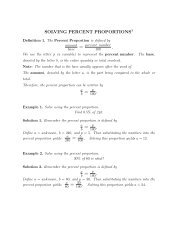WNCC 2010 Self-Study Report - Western Nebraska Community ...
WNCC 2010 Self-Study Report - Western Nebraska Community ...
WNCC 2010 Self-Study Report - Western Nebraska Community ...
You also want an ePaper? Increase the reach of your titles
YUMPU automatically turns print PDFs into web optimized ePapers that Google loves.
Service Area Day Time<br />
Independent Learning<br />
and Assessment Center<br />
Monday – Thursday<br />
Friday<br />
07:30 a.m. to 09:00 p.m.<br />
07:30 a.m. to 04:00 p.m.<br />
Writing Center<br />
Math Center<br />
Monday – Thursday<br />
Friday<br />
Monday – Thursday<br />
Friday<br />
09:00 a.m. to 06:00 p.m.<br />
09:00 a.m. to 03:00 p.m.<br />
08:00 a.m. to 06:00 p.m.<br />
08:00 a.m. to 03:00 p.m.<br />
Students fill out evaluative surveys about the effectiveness, convenience, and quality of<br />
their visits to the Math Center, the Writing Center, and the Independent Learning and<br />
Assessment Center (ILAC) each semester. Student satisfaction remains consistently<br />
positive, as specific results of student opinions about the operations of these support<br />
services will show when they appear elsewhere later in this report.<br />
As previously mentioned, students can now access Smart Thinking online tutoring services<br />
nearly any time of the day or night. <strong>WNCC</strong> purchased 5,000 hours of tutoring time spread<br />
across the disciplines which Smart Thinking covers. Any student at any location registered<br />
into a <strong>WNCC</strong> class may use the service, but it is anticipated that online enrollees are the<br />
most likely to take advantage of the help available, and online instructors inform students<br />
about the opportunity. The service has not been in place long enough to gauge either its<br />
effectiveness or even the extent to which it will be used. However, providing the service<br />
adds an additional dimension of available, multi-discipline tutoring for both online and<br />
traditional students.<br />
Observations and Possible Strategies to Address Needs<br />
Enrollment<br />
In order to maintain viable enrollments and for the good of the students who are not<br />
persisting in their education, the College intends to launch a retention/success initiative in<br />
order to collect more comprehensive information about student success, particularly in the<br />
developmental courses, which, not surprisingly, have the highest attrition rates. Although<br />
<strong>WNCC</strong> does not participate in the national Achieving the Dream movement, key program<br />
organizers like Dr. Byron McClenney from the <strong>Community</strong> College Leadership Program at<br />
the University of Texas--Austin urge people at other community colleges to collect the wellpublished<br />
key data points that Achieving the Dream participant institutions use in order to<br />
obtain information to help develop strategies to increase student learning and retention.<br />
When the data collection is implemented, figures relating to the rate of student<br />
advancement into other sequenced classes, success in subsequent developmental<br />
education courses, and the tracking of individual performance into college-level work and<br />
through to graduation or certificate, diploma or degree attainment, will be gathered.<br />
College personnel seek to build a longitudinal data base to use for data-informed decision<br />
making. Particularly, attrition rates are a primary concern, and the hope is that data can<br />
help faculty and staff members create effective strategies that can be implemented when<br />
Page 30<br />
<strong>Western</strong> <strong>Nebraska</strong> <strong>Community</strong> College



